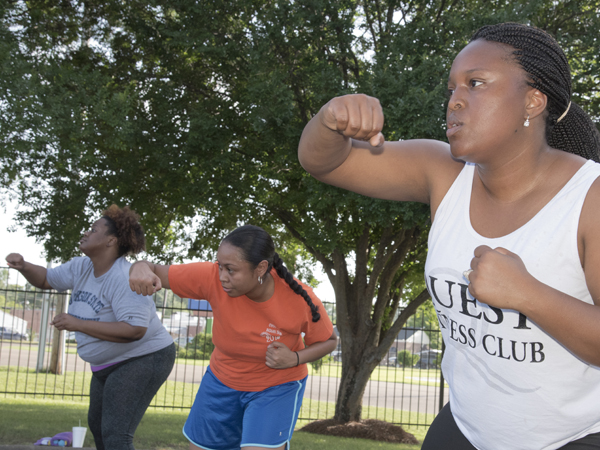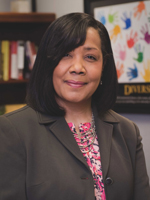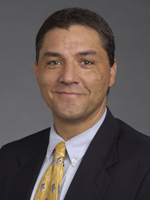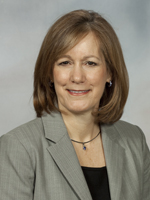Research, relationships road to reducing health disparities

A new collaboration between two programs dedicated to eliminating health disparities, both named for female African-American civil rights leaders, isn't your traditional agreement.
"So many groups work in silos," said Dr. Bettina Beech, University of Mississippi Medical Center associate vice chancellor for population health and professor of pediatrics and family medicine.
She says that won't be the case in a budding research relationship between UMMC's Myrlie Evers-Williams Institute for the Elimination of Health Disparities and Wake Forest Baptist Medical Center's Maya Angelou Center for Health Equity in Winston-Salem, N.C. The two entities have recently signed a memorandum of understanding, or MOU, that details their plans to together perform health disparities research across multiple platforms.

Here's why it's different and why it matters, Beech said. "It's one thing to say you are partners. It's another to sign a MOU," she said. "This is an agreement between a public and a private institution. Both of the programs are named after internationally regarded African-American women. That's unique."
Myrlie Evers-Williams, a civil rights activist and widow of slain civil rights leader Medgar Evers, and the late Maya Angelou, hailed globally for her poetry and commitment to civil rights, "are two individuals with very strong voices in human rights and social justice," Beech said.
The two programs will exchange resources and people in an effort to address health risk factors, among them obesity and diabetes, that are common to Mississippi and North Carolina. The exchange will include a co-sponsored research lecture series; health disparities research, training and education programs; collaboration on research grants; and a research exchange program for medical and biomedical science students and faculty.
"People throw around the word 'partnership,' but we are bringing together resources to address very complex issues," said Beech, who also serves as executive director of the Myrlie Evers-Williams Institute.
For Beech, the collaboration is the culmination of a vision several years in the making. She served as co-director of the Maya Angelou Center at Wake Forest Baptist before coming to UMMC in January 2013.
There, she and Dr. Ronny Bell, also co-director of the Maya Angelou Center, began discussing a possible long-term affiliation between UMMC and Wake Forest Baptist. At the time, Beech was the principal investigator for a study examining risks of obesity, diabetes and other metabolic conditions in African-American youth in a collaboration between Wake Forest Baptist and UMMC's Jackson Heart KIDS Study.

"We developed a good working relationship, and we felt like we had a lot of great initiatives going on," said Bell, professor in Wake Forest Baptist's Division of Public Health Sciences and director of the Maya Angelou Center.
"When she moved down there, we thought we could continue to work together," he said of himself and Beech. "We have similar missions to address health disparities. We really feel like this is very unique, given the namesakes of both of our centers."
The collaboration "gives us the opportunity to bring together other researchers and resources to improve the health of Mississippians, and to decrease the health disparities that occur by race, ethnicity, income, gender, geographic location and sexual orientation," said Dr. Jennifer Robinson, associate professor in the UMMC School of Nursing.

"As a nation, we've been working on health disparities and inequalities for a long time. It's complex. It's an incessant problem," Robinson said. "It will take that critical mass of scientists and policy makers who are focused on it to make the difference in achieving health equality."
At a time when research dollars can be scarce at both public and private institutions, the agreement makes sense, Beech said. "It's best to bring the two together, rather than competing for resources," she said.
It also allows both institutions to take advantage of educational offerings that the other does not have. "Wake Forest Baptist has a Division of Public Health Sciences that's as big as some schools of public health," Beech said.
"I'm excited about our young researchers going to Wake Forest Baptist to work with researchers there. They have different types of research than we have, and only a small number of our faculty focus on population studies. Every place can't have every program, so these partnerships are important so that we can have economies of scale."
Bell said about 70 of Wake Forest Baptist's faculty members are affiliated with the Maya Angelou Center, and about a quarter of those are obesity or diabetes researchers. "We've also done work in cancer and HIV," he said.
The collaborative research provides an opportunity to focus on the varied populations in Mississippi and North Carolina, Bell said. "In Mississippi, you have a larger portion of the population that is African American than here, but we have a fairly sizeable American Indian population, and our Hispanic population is growing," he said. "And, like in Mississippi, our challenges include having a pretty large population living in rural areas."
It's important to note, Robinson said, that "other institutions want to partner with UMMC. Sometimes, we don't appreciate what we have to offer in resources, expertise and different perspectives. I see a real institutional commitment to achieve better health for the people of Mississippi."
Bell and Beech say now more than ever, universities and academic medical centers should join together to conduct research and exchange information.
"In our age, just from a technological standpoint, there's more of an emphasis in science and education to not work in silos," Bell said. "We want to be respectful of that, and that we are able to work together and to utilize the resources we each have."
What makes the collaboration so solid, Beech said, is that the MOU makes it permanent.
"So often, they're based on personalities," Beech said. "If I leave here, the partnership still exists."


